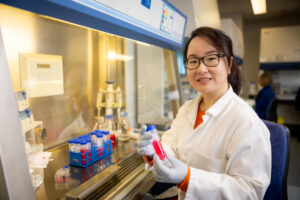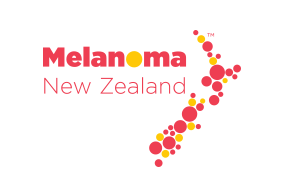Dr. Gu’s Global Collaboration to Unlock New Treatment Options
(research being co-funded by the Melanoma New Zealand Research Fund and Cancer Research Trust NZ)
Starting this September New Zealand melanoma researcher Dr Andrea Gu will spend 18 months working alongside Dr David Adams, Head of Experimental Cancer Genetics at the high-profile Wellcome Sanger Institute in the UK.
An emerging talent in lab-based melanoma research in New Zealand, Dr Gu wants to find new treatment options for advanced melanoma patients. The opportunity to collaborate with an international expert in an institute known for its cutting-edge research in genetics, especially in cancer treatment, is hugely significant.

Dr Andrea Gu
“The fact that someone of Dr Adams’ standing is backing this project and has invited Dr Gu to the Wellcome Sanger to do this work, when he could take anyone from anywhere around the world, is really exciting,” says Andrea Newland, Chief Executive of Melanoma New Zealand.
“And then later returning to New Zealand with the knowledge she learns in the UK, Dr Gu will enhance the quality of melanoma research that’s happening in Auckland with the best of what’s happening in the world.”
It’s vital research considering New Zealand is a skin cancer hot spot with one of the worst rates of melanoma in the world (alongside Australia), and the highest melanoma death rate of any nation.
Dr Gu explains; “Treatments like immunotherapies and targeted therapies have proven success, saving and extending many lives. But there are some patients who don’t respond to these treatments and others who respond initially and develop resistance to the drugs later. It highlights the urgent need for new treatment strategies to overcome drug resistance.
“In my research, I will use new gene-editing technology with the aim of identifying genes linked to drug resistance in melanoma. This can help us uncover new treatment options for melanoma patients.”
Dr Adams will act as her mentor while in the UK. He says, “Dr Gu’s project is both timely and innovative and her approach has the potential to uncover new genetic dependencies and therapeutic targets that can significantly advance the field of cancer treatment.”
After her time at the Wellcome Sanger Institute, Dr Gu will come back to New Zealand and apply what she and Dr Adams have learnt to make it more specific to our population by screening melanoma cell lines donated here in New Zealand by a broad spectrum of melanoma patients.
Working in lab-based research she speaks about gene sequencing, gene editing, CRISPR technology, melanoma cell lines, gene paralogs, bioinformatics, – it’s complex, jargon-filled scientific territory for most of us. But ultimately, she’s seeking new treatment options for people who are out of options, and her work could mean the difference between life and death for the next generation of melanoma patients.
If successful, her work could have global significance not only for melanoma patients, but also for those battling other cancers with tumours that share similar genetic mutations.
“The very ambitious goal would be to find something that’s very effective and can actually move cancer treatment forward a step… to find something that may have a large benefit to a large population,” says Dr Gu.
During her time at the Wellcome Sanger Institute Dr Gu will be using cutting edge gene sequencing systems and technology not available in New Zealand which will both increase the chances of success (using multiple different systems helps validate findings) and she’ll be working alongside international counterparts.
She’s excited about that; “One thing that’s really exciting is that I will be not only learning many new techniques, but also able to work with researchers from around the world.”
This groundbreaking research is being co-funded by Melanoma New Zealand and the Cancer Research Trust New Zealand (CRTNZ), both funding Dr. Gu’s 18-month research project titled; ‘Investigating resistance mechanisms to MAPK signalling inhibitors in melanoma using CRISPR-mediated combinatorial screening.’
It’s the first funding commitment from the newly established Melanoma New Zealand Research Fund, a crucial initiative run in partnership with CRTNZ to drive melanoma research in New Zealand and improve patient outcomes.
Andrea Newland says Melanoma New Zealand is proud to be investing in research as a new area of impact aligned to the charity’s goals. “The shared vision is clear – to improve the survival rates of melanoma patients with new treatments. There is the potential for Dr Gu’s work to contribute towards achieving that, and it would be founded on a uniquely New Zealand contribution to melanoma research.”
Applications are open from 2 June – 2 August 2025 for the Melanoma New Zealand Research Fund.
Key points:
- New Zealand has the highest melanoma mortality rate globally, resulting in the deaths of more than 300 Kiwis each year.
- Access to anonymised tumour samples donated by New Zealand melanoma patients will allow Dr Gu to utilise her new knowledge and gain insights specific to the New Zealand population – only possible through the generosity of those who chose to make this gift while facing significant personal health challenges.
- This research has the potential to significantly improve health outcomes and quality of life for melanoma patients in New Zealand.
- This includes Māori, Pasifika, and Asian populations, who, despite having lower melanoma incidence, may experience poorer outcomes.
- Investment in research, along with the emergence of immunotherapy and targeted therapies (including immune checkpoint inhibitors and MAPK signalling pathway-targeted inhibitors), has proven to be effective in treating metastatic melanoma. However…
- Many melanoma patients initially respond to targeted therapies and immunotherapies, but up to 60% of patients with advanced melanoma develop resistance to these treatments, leading to treatment failure and poor outcomes.
- Melanomas frequently contain gene mutations, including BRAF (40-50% of melanomas) and NRAS (15-20%). BRAF-mutant melanoma can be treated with BRAF and MEK inhibitors, but patients with NRAS mutations often have a poorer prognosis due to limited treatment options.
- Melanoma’s ability to develop resistance to treatments like immunotherapy and targeted therapy underscores the need for novel approaches, such as the research Dr. Gu is undertaking.
- Global collaboration and the use of cutting-edge technologies like CRISPR could lead to breakthrough discoveries that benefit not only melanoma patients but also those with other cancers sharing similar genetic mutations.
